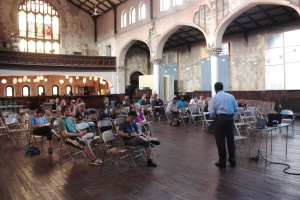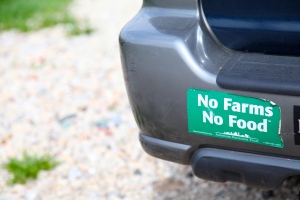While many residents purchase their vegetables at places such as Whole Foods, Wegman’s, and Superfresh, a rising subculture is growing their own produce right in Baltimore’s backyard.
“I was once offered a tomato, a perfect red round tomato. To the eye it was pretty but I did not touch it. I didn’t want anything to do with it,” said Eton Codling, USDA Research Agronomist and educator on soil contamination for the second Urban Farm Workshop. “My friend, he asked me why I did not want it. There were no bug bites or holes on it. Why would I want to eat something not even the bugs would want to eat?” Codling said.
Urban Farm Workshops, a three-part series held on Wednesday evenings throughout April at Space 2640 by the Farm Alliance of Baltimore City, has dedicated its knowledge and volunteers to educate newcomers on how to successfully cultivate their own gardens.

Eton Codling, USDA Research Agronomist and educator on soil contamination speaking for the second Urban Farm Workshop
A trap that many have fallen into, especially those who are not familiar with gardening, is that an aesthetically pleasing piece of produce is the most healthy piece of produce. Not the case.
Urban Farm Workshops give knowledge on how to grow and obtain healthy produce. Topics such as building healthy soil and urban gardening laws were also present. Speakers such as Codling of the USDA Research Agronomist and Dane Nester of Cafe Sage drew in eager crowds of both amateur and seasoned urban gardeners.
Don’t self garden but want fresh, organic produce?
Not a problem.
“Real Food Farm at 2801 St. Lo Drive is a good option since they are on-site. They have open volunteer hours 9 a.m. to noon so you can even pitch in for a few minutes… no need to sign up, you can just show up,” said Maya Kosok, coordinator of the Farm Alliance of Baltimore.
Real Food Farm sits behind Lake Clifton-Eastern High School on six acres in Northwest Baltimore. They began
in 2009 and have been growing fresh produce, educating youth and partnering with a number of community organizations. Volunteers spread out on the farm planting, picking, watering, trimming and putting their hands on anything that needs tending to.
“Baltimore is on the cutting edge of urban farms across the nation,” said Connor Horne, Agricultural Project Coordinator from Americorp. “It’s not about competition, it’s about collective effort. If we share the resources we collectively get better,” Horne said.
Right now, Real Food Farms has spinach, potatoes, kale, cabbage, radishes and beets available. Due to the late arrival of spring, planting and picking were behind. Cafe Sage is one of many restaurants that use fresh produce daily.
“We’re having fish tacos for lunch today at the restaurant,” Dana Bechert said. “The kale is late to be picked and needs to go, so they are just letting us have it for free. It’s really great with something tangy.”
There’s a place for every piece of produce at Real Food Farms. Nothing is ever let go to waste. Utilizing the land, soil and effort of the volunteers to their maximum potential is one of the many positive traits that Real Food Farm has.
“The kale went immediately to flower because of the late spring. You wouldn’t be able to sell this at a conventional market because a lot of people aren’t used to seeing that. It has incredibly sweet flavors and the flowers are really beautiful so we like to work with that at our shop and I think that will be a trend. You’ll see a lot of products like this being really valued even though they aren’t something that you would normally see,” Nester said.
Along with Cafe Sage, Real Food Farms supply a number of local restaurants such as Woodbury Kitchen, Carma’s Cafe, Donna’s and Atwater’s in Towson.


